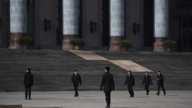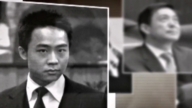【新唐人2012年5月28日讯】王立军、薄熙来事件让外界看到了中共内斗的激烈和血腥,中共新一代领导班子计划在不久后的十八大上亮相,促使许多人在思考,“动乱的中共”是否为中国和平转型提供了最佳机遇?哪条道路更适合中国?最近有两位中国学者分别出书,指出了中国走向民主的路线图,以及为实现民主所应奠定的基础。
资深宪政学者张博树,在“中国社会科学院”拿了哲学博士学位,并在那里做了20年的理论研究。但体制内容纳不了他的独立主张,他在2010年被赶出了“社科院”。
不过,张博树继续探索中国宪政改革之路,他的新书《中国宪政改革可行性研究报告》就是成果之一。
宪政学者张博树:“400页的一本书,做了很详细的讨论。如果最简单的概括的话,那就是中国宪政的转型,现在到了各方面条件、各方面的情况很成熟,这件事情早就应该做了,而且现在是越来越有必要应该去做。”
张博树指出,他书中两个宪政改革最基本的要点,一个是,经过60年证明,中共现存的政治制度有很多问题,需要做体制性的根本变革,用符合现代潮流的民主制度来替代,这也是中国的根本出路所在;另一个是,转型的路径,就是通过“体制内外互动和合作”的方式,来实现中国的和平转型。
张博树认为,渐进性和平转型风险小,不会引起大的社会动荡。
同样刚出版了新书《大转型-中国民主化战略研究框架》的中国学者王天成,现在还在美国“宾夕法尼亚大学”法学院就读学位,王天成对于中国体制改革的观点不同。
原“北京大学”法律系讲师王天成:“快速的变革更有利于民主转型的成功,转型的过程越长、越缓慢,发生动荡的可能性就越大。而且对于中国这样一个国家来说,有民族分裂的问题尤其危险,它有可能导致国家的分裂。”
王天成指出,中共“6.4屠杀”后,很多学者寻找代价更小的、渐进式民主改革之路。但他认为,“渐进改革”是寄希望于“政府主动改革”,但中共统治集团主动选择改革的可能性非常小。实际上民主转型是靠压力的,所以“渐进改革”不仅不现实,而且还对人们产生误导。
王天成研究发现,过去30年中,有70多个国家民主化,其中50多个是通过非暴力抗争转型的,转型后民众享有更多的民主。而14个“自上而下”改革转型的国家,现在多数还是威权国家。
王天成:“中国民主转型问题的发生条件,只有两种情况下会发生:一种是当统治集团承受不了控制成本的时候,社会越来越反叛;另外就是大规模的民众抗议导致维权统治崩溃。”
王天成认为,现在中国的维稳预算超过军费,说明中共政府压力越来越大。当中国民间自发抗争转移到战略抗争方式的时候,就很可能会发生民主转型了。而且中国经济的增长也走到了尽头,根据过去的经验,每一次的经济危机都使一批独裁者倒下,中共政府难过的日子已经来了。
时事评论员张杰连也认为,“王立军事件”揭开了中共和政法委罪恶的黑幕。从江泽民开始,“政法委”不惜以彻底摧毁社会的道德体系和社会风气来迫害法轮功,有意让“政法委”做大。现在“政法委”成为迫害全体中国民众的最主要工具。
张杰连认为,要想人心回归,社会恢复正气,首先得把罪恶累累的“政法委”,包括江泽民、罗干、周永康、薄熙来等送上历史的审判台,偿还他们所犯的罪恶。
张杰连:“在这样的局面下,其实后面要走什么样的路,自然就出来了,中国社会的道路的答案自然就会出现。如果前面都不做的话,跳过这个阶段去探讨后面,只是一种学术研究的价值,但它不具备现实的需要。”
因此,张杰连认为,中国民主转型前,首先要恢复民心和社会正气。
采访/秦雪 编辑/宋风 后制/萧宇
China’s Democratic Paths
The Wang Lijun and Bo Xilai event showed that infighting has
intensified within the Chinese Communist Party (CCP).
A new generation of CCP leadership will be unveiled shortly
in the 18th National People’s Congress Meeting.
Many are thinking, “CCP unrest” may provide the best
opportunity for a democratic transition.
The question is, which path to democracy is more
suitable for China?
Recently, two Chinese scholars published books, laying out
a road map towards democracy for China.
Senior constitutional scholar Zhang Boshu, obtained his Ph.D.
in the Chinese Academy of Social Sciences,
and has been involved in theoretical studies,
there for 20 years.
But the CCP system could not tolerate
his independent advocate.
In 2010, he was expelled from the
Academy of Social Sciences.
Zhang continued to explore the road of
constitutional reform in China.
His new book, The Feasibility Study Report Of
Constitutional Reform is one of the outcomes.
Zhang said: “A book with 400 pages included a very detailed
discussion.
For short, various conditions and situations are
suitable for the constitutional transformation in China.
This should have happened long ago.
It is now increasingly necessary to get it done."
Zhang Boshu pointed out two basic points
of constitutional reforms in his book.
One is, after 60 years of practice, the existing political
system of the CCP has many problems, and needs fundamental changes.
In needs to be replaced with an institutional democratic
system in line with the modern trend, which is the fundamental way out.
The other path of transformation is, with “internal and
external interaction and cooperation within the system”, to realize peaceful transition.
Zhang believes the progressive and peaceful transition has
the smallest risk, and will not cause social unrest.
Chinese scholar Wang Tiancheng also just published a new
book, The Great Transformation – Strategic Framework for Democratization of China.
Wang is pursuing a degree in the law school of the
University of Pennsylvania.
Wang Tiancheng has a different view on China’s reform.
Wang Tiancheng, former lecturer of the Law School in
Peking University: “Rapid change is more conducive to the success of democratic transition.
The longer the process of transformation takes, the more
slowly it goes, the greater is the likelihood of turbulence occurring.
For China, ethnic separatism is particularly dangerous.
It may lead to splitting-up of the country."
Wang Tiancheng pointed out, after the CCP ‘4th June’ massacre,
many scholars were looking for a less costly, progressive democratic road to reform.
But he believes, progressive reform relies on the
government’s initiative to reform.
But the possibility for the CCP to choose to
reform is very small.
Democratic transition should rely on pressure.
So progressive reform is unrealistic, and also misleading.
Wang Tiancheng found that in the past 30 years,
over 70 countries realized democratization.
Among which 50 were transformed through non-violent
protest, and people enjoy more democracy after the transformation.
On the other hand, there are 14 from the top-down
reformed countries, are still mainly authoritarian states.
Wang Tiancheng: “Only two conditions can cause
democratic transition to occur in China.
One is when the ruling group could not afford the control
costs, and the society becomes more rebellious.
The other is large-scale protests leading to
the collapse of the ruling."
Wang believes that China’s stability maintenance budget is
over military expenditures, showing the Chinese regime is under increasing pressure.
When spontaneous protests shifted to a strategic protest,
the transition to democracy is likely to occur.
China’s economic growth has also come to an end.
Based on experience, every economic crisis caused a dictator
to fall, the Chinese regime’s last days have arrived.
Commentator Zhang Jielian also believes the Wang Lijun event
opened the evil inside stories of the CCP and Political and Law Commission.
From Jiang Zemin, the Politics and Law Committee have
persecuted Falun Gong without even hesitating to completely destroy the moral system and social atmosphere.
They intentionally helped the Politics and Law Committee grow.
Now the Politics and Law Committee have become the most
important tool in persecution of the entire Chinese people.
Zhang Jielian believes in order to rectify the people’s minds,
to restore social righteousness, firstly we should put all
sinful members of the Politics and Law Committees,
including Jiang Zemin, Luo Gan, Zhou Yongkang, Bo Xilai,
on historical trial for repayment of the sins they committed.
Zhang Jielian: “In such a situation, the way has
naturally presented itself.
The answer to the road ahead for Chinese society
will appear naturally.
Without putting evil on trial, skipping this stage to explore
things in the next step, is just academic research,
but will not satisfy the needs of this current society."
Zhang Jielian believes before Chinese democratic transition,
we should firstly restore people’s minds and social uprightness.






























